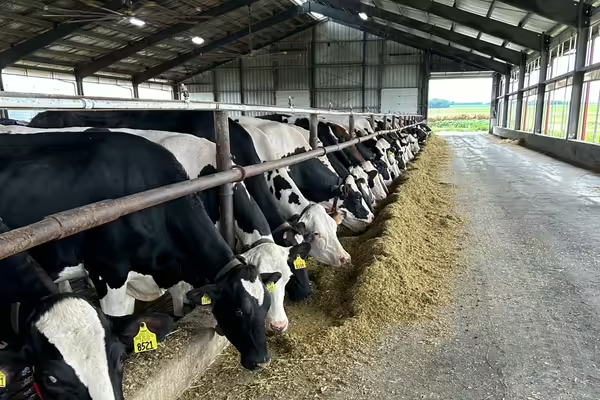
Illinois Extension’s Summer Twilight Series continues to provide unique opportunities to learn about southern Illinois food production, agriculture industries, and businesses. Over the past 10 years, the Summer Twilight Series has provided entrepreneurs, business owners, and curious community members the opportunity to network, tour local farms and operations, and learn more about production and marketing strategies from experts.
The June Summer Twilight Series program featured a tour of Weiler Enterprises Inc., a dairy farm in Claremont, Illinois. Travis and Erin Michels began their dairy operation in 2012; however, their family’s history of dairy farming began long before that. Erin’s father, Bill Weiler, noted that he, his father, and grandfather were all dairy farmers previously.
The revival of the family dairy farm started with Travis and Erin, two tractors, and 50 cows. At that time, the cows were all milked by hand. Then, in 2016, the Michels’ family moved to their current location, incorporated as Weiler Enterprises, and invested in two Lely A4 milking robots. Today, they raise both angus cross cattle for beef and holstein cattle for milk production while farming corn, soybeans, and wheat. Erin also teaches at Red Hill High School.
The dairy farm is a 24/7 operation that combines technology, recycling methods, self-reliant strategies, and family to ensure its success. The main barn houses the milk production, which includes cattle in various stages of their calving cycle and the milking robots. Every hour, the barn is automatically cleaned with a stream of water flowing through the stalls. The material swept away in the cleaning cycle is then reused in multiple ways: the manure makes its way onto local fields while the water is cycled through multiple processes and eventually used to clean the stalls again.
As for the cows, each is outfitted with a sophisticated necklace and transponder that connects to the milking robots and collects a wide range of data. The data recorded keeps track of each cow’s general habits, can help sort them for vaccinations, and even identifies the best time for breeding. The cows are also fed with a specifically formulated ration—almost all of which is homegrown by the Michels family. A new robot will arrive at the farm soon to help with the feeding process as well.
According to Travis, heifers (female cows) must reproduce every 12-14 months to produce milk. Once they begin producing, the cows visit the milking robots 2-6 times per day, depending on their lactation cycle. As the robot milks each cow, it collects information such as average milking time, how many pounds of milk are collected, the temperature of the milk, and more. Altogether, the farm produces approximately 22,000 pounds of milk every other day. The milk is stored in a large, temperature-controlled tank and then picked up by Prairie Farms.
As the cycle continues, so does the family tradition. Travis and Erin’s four children, August, Gentry, Willis, and Becket, are all involved in the daily operations. As for the future, Travis and Erin are open to expanding the dairy farm if their kids would like to join the family business.
Erin noted, “It’s a labor of love; that’s what it has been.”
The Summer Twilight Series continues July 17 with a visit to the Dixon Springs Agricultural Center in Simpson, ending with the final tour on August 18 at Wild Child Flower Farm in Sumner. For more information about the remaining Summer Twilight Series programs, visit go.illinois.edu/twilightseries or call 618-695-2441. If you need a reasonable accommodation to participate, please contact Bronwyn Aly at baly@illinois.edu. Early requests are strongly encouraged to allow sufficient time to meet access needs.
University of Illinois Extension develops educational programs, extends knowledge, and builds partnerships to support people, communities, and their environments as part of the state's land-grant institution. Extension serves as the leading public outreach effort for University of Illinois Urbana-Champaign and the College of Agricultural, Consumer and Environmental Sciences in all 102 Illinois counties through a network of 27 multi-county units and over 700 staff statewide. Extension’s mission is responsive to eight strategic priorities — community, economy, environment, food and agriculture, health, partnerships, technology and discovery, and workforce excellence — that are served through six program areas — 4-H youth development, agriculture and agribusiness, community and economic development, family and consumer science, integrated health disparities, and natural resources, environment, and energy.